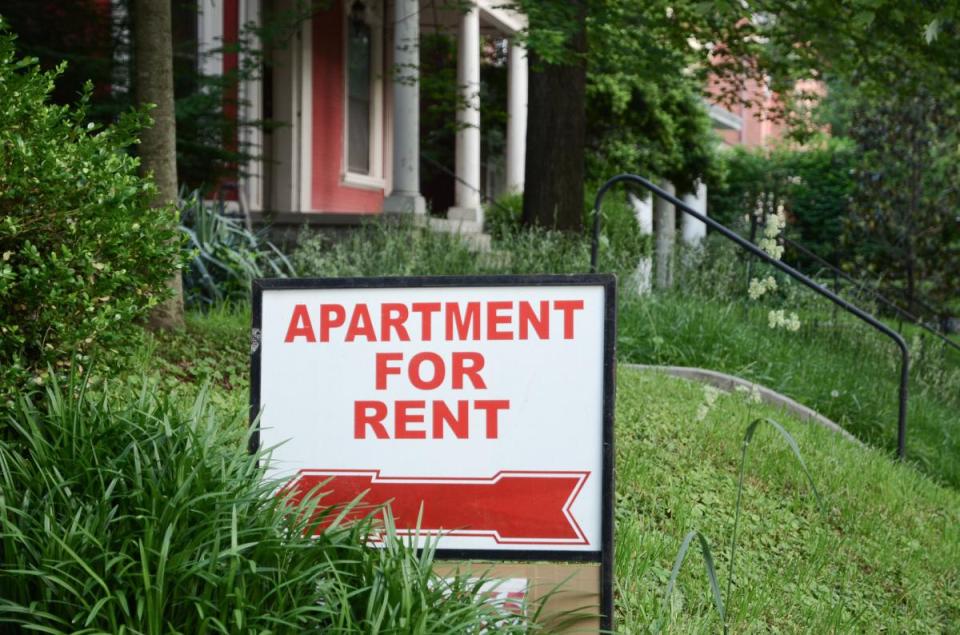How to Rent an Apartment with Bad Credit & Still Get Approved
Bad credit doesn’t have to stop you from getting a place to live. While landlords often check your credit report, it’s not the only thing they consider—and it’s not a guaranteed deal-breaker. If your credit score is under 600, or you’ve had issues like collections or late payments, you still have options.

This guide breaks down exactly how to rent an apartment with bad credit. From what landlords actually care about to strategies that improve your chances, you’ll learn what steps to take and how to make your application stand out—even if your credit history doesn’t.
Can You Get Approved for an Apartment With Bad Credit?
Yes, you can. Renting with bad credit takes more planning, but it’s absolutely possible. Plenty of people have done it—and so can you. The key is showing the landlord that you're financially stable today, even if your credit report shows problems in the past.
What Landlords Look At Beyond Your Credit Score
While your credit score can influence a landlord’s decision, it’s only one piece of the puzzle. Most landlords will also consider:
- Your income: If your monthly income is at least 2.5 to 3 times the rent, that can work in your favor.
- Employment status: Steady work with reliable paychecks looks better than gaps in income.
- Rental history: On-time rent payments and good relationships with previous landlords matter more than your credit score in some cases.
- References: Personal and professional references can add credibility.
- Savings or assets: Showing a healthy bank balance or emergency fund can help reduce the perceived risk.
If you can provide proof that you’re financially responsible now, some landlords will be willing to overlook the credit score entirely.
What’s Considered “Bad” Credit for Renting?
Most landlords consider anything below a 620 credit score to be bad or subprime. Some stricter property managers may use 650 as the cutoff. But a low credit score doesn’t always mean a denied application.
Issues that may raise red flags include:
- Recent evictions
- Unpaid utility bills
- Multiple collections accounts
- Large past-due credit card balances
That said, there’s no universal rule. A local landlord might be flexible, while a large property management company may have set requirements. Either way, you can improve your odds by being prepared.
Best Strategies to Rent With Bad Credit
Renting with bad credit is about building a stronger case in other areas. Here are some of the most effective strategies that actually work.
Provide Proof of Income or Employment
One of the best ways to build trust with a landlord is to show that you can afford the rent. That means submitting documents like:
- Recent pay stubs
- Bank statements showing regular deposits
- Tax returns (especially for freelancers or self-employed applicants)
- A letter from your employer confirming your job and salary
The more proof you can offer that you earn enough—and consistently—the better.
Offer a Larger Security Deposit or Prepay Rent
Money talks. If you're in a position to offer a larger deposit or pay a few months of rent in advance, it shows that you’re serious and financially stable.
Many landlords are more comfortable renting to someone with bad credit if they have cash upfront. It reduces their risk and shows you're committed to the lease.
Use a Co-Signer or Guarantor
A co-signer (or guarantor) agrees to take legal responsibility for the rent if you can’t pay. Landlords often accept applicants with poor credit if someone with good credit co-signs the lease.
This option works best with someone you trust, like a family member or close friend. Just make sure they understand the risk—and that you follow through on every payment.
Get a Roommate With Good Credit
If your credit score is a problem, consider teaming up with someone who has a stronger financial profile. Many landlords will average the scores of all applicants or rely more heavily on the strongest one.
This strategy works best when both parties are listed on the lease and are equally responsible for rent.
Provide References From Past Landlords
Strong rental references can go a long way. A quick note from a previous landlord saying you paid rent on time, kept the place in good shape, and followed the lease terms can help ease concerns about your credit history.
Landlords trust other landlords, especially if the reference is recent and includes direct contact information.
Write a Strong Rental Application Letter (With Sample)
A rental letter gives you the chance to explain your credit situation and share why you’re still a great tenant. Keep it honest, positive, and focused on what’s changed.
Here’s a sample rental application letter tailored for someone with bad credit. It's structured to be short, clear, and persuasive—while owning the credit issue without over-explaining.
Dear [Landlord's Name],
Thank you for considering my rental application. I wanted to take a moment to address my credit history and provide some additional context.
A few years ago, I went through a difficult period that affected my credit score. [For example: I lost my job during the pandemic and fell behind on a few bills.] Since then, I’ve made steady progress. I’m now employed full-time with stable income, and I’ve never missed a rent payment.
I can provide proof of income, a larger security deposit if needed, and references from past landlords who will vouch for my reliability and respect for the property. I also have no evictions or judgments on my record.
I’m responsible, quiet, and take pride in keeping my home in good condition. I’m confident I’ll be a good tenant and would appreciate the chance to speak with you further or answer any questions.
Thank you again for your time and consideration.
Sincerely,
[Your Full Name]
[Phone Number]
[Email Address]

Where to Look: Finding Landlords Who Accept Bad Credit
Not all landlords treat credit scores the same. Some won’t budge, while others are more flexible if you can show steady income or a solid rental history. Knowing where to focus your search can save you a lot of wasted time.
Individual Landlords vs Property Management Companies
If your credit score is low, you’ll likely have better luck with individual landlords than with large property management companies. Big firms often have rigid screening systems that automatically reject applicants below a certain score.
Private landlords are more likely to look at the whole picture and give you a chance to explain your situation. They may be open to alternatives like co-signers, extra deposits, or advance rent payments.
Use Keywords Like “Second Chance Rentals” or “No Credit Check Apartments”
When searching online, don’t just type “apartments for rent.” Use search terms that match your situation:
- Second chance apartments
- No credit check apartments
- Bad credit accepted rentals
- Flexible landlords near me
These keywords can lead you to listings specifically geared toward renters who’ve had financial issues in the past.
Try Craigslist, Facebook Marketplace, Local Classifieds
While large apartment websites often show professionally managed listings, sites like Craigslist and Facebook Marketplace are where individual landlords post. These platforms can be a good place to find month-to-month leases, smaller buildings, or landlords who don’t run credit checks.
Be cautious of scams—never send money without seeing the property in person and confirming the identity of the landlord.
Consider Sublets or Lease Transfers
Subletting or taking over someone’s lease can be a smart move if your credit score is holding you back. Many tenants just want someone to take over their lease and are less concerned with your credit report. These arrangements are often short-term and give you time to build credibility as a renter.
You can find these through local housing groups on Facebook, bulletin boards, or community forums.
How to Strengthen Your Rental Application
Even if your credit score is working against you, there are ways to make the rest of your application much stronger.
Show Bank Statements or Tax Returns
If you can’t impress with your credit report, show your current financial stability. Recent bank statements or tax returns can help prove that you have enough income or savings to cover the rent.
Landlords want to know you can afford the place. Showing several months of consistent deposits or an emergency fund gives them peace of mind.
Explain Negative Marks With a Brief Credit Letter
A short letter explaining your credit issues shows that you’re not hiding anything. Be honest but brief. Focus on what’s changed—like getting a steady job, catching up on bills, or creating a budget.
This is your chance to take control of the narrative and show that you’re financially stable now, even if things looked different a year or two ago.
Highlight On-Time Payments (e.g., Utilities, Car Loan)
If you’ve been making regular, on-time payments—especially for things like a car loan, phone bill, or utilities—be sure to include that. These don’t always show up on a traditional credit report, but they still show financial responsibility.
Consider printing payment histories or setting up a rent reporting service that tracks on-time rent going forward.
Should You Mention Your Credit in Advance?
There’s no one-size-fits-all answer here. Whether you bring up your credit score early depends on the situation and your overall application strength.
When It Helps to Be Proactive
If your credit report has serious issues—like recent collections, a bankruptcy, or an eviction—it’s usually better to bring it up upfront. Pair it with what you’ve done to recover, and you might come off as more trustworthy.
Being proactive can also save you time. If the landlord has a strict policy, better to find out before paying an application fee.
When You Might Wait Until Asked
If your credit score is below average but not terrible, and the rest of your application is strong, it’s often better to let the landlord ask. You don’t want to highlight a weakness that they might have overlooked.
Focus first on showing that you’re employed, have enough income, and can provide strong references. If the credit issue comes up, then you can explain.
Improve Your Credit While Renting
Even as you look for a rental now, it’s smart to start working on your credit so the next place is easier to get.
Dispute Errors on Your Credit Report
Mistakes on your credit report are more common than most people think. If you find accounts that aren’t yours or outdated negative marks, dispute them with the credit bureau. Removing even one collection account can raise your credit score.
You can request free copies of your credit report at AnnualCreditReport.com and file disputes directly with each credit bureau.
Get Added as an Authorized User
If someone with strong credit adds you as an authorized user on their credit card, that account can show up on your credit report and boost your score—without you having to use the card. Just make sure the account is in good standing and has a solid payment history.
Use a Rent Reporting Service
Most landlords don’t report your on-time rent payments to the credit bureaus, but third-party services like RentTrack and Experian RentBureau can help. These rent reporting services add your payment history to your credit report and help you build credit while paying rent.
Just confirm your landlord is willing to participate, or find a platform that doesn’t require landlord verification.
Common Mistakes to Avoid
Trying to rent with bad credit already has challenges. Don’t make it harder on yourself by making preventable errors.
Lying on a Rental Application
It might be tempting to stretch the truth, but lying about income, employment, or past rental history can get your application denied—or worse, get you evicted later. If the landlord finds out, trust is broken and legal trouble could follow.
Stick to the facts and build your case around your strengths.
Submitting Incomplete or Disorganized Paperwork
A messy application sends the wrong message. Always include everything requested—pay stubs, ID, references, and application fees—up front. Missing documents can get you passed over in favor of someone more organized.
Presenting a clean, professional application can help offset concerns about your credit.
Applying to High-End Apartments Without a Plan
Luxury buildings and large complexes often have strict credit requirements and automated systems that reject low scores without human review. If you’re applying to these places without offering extra income proof, a co-signer, or a large deposit, it’s probably a waste of time and money.
Focus on rentals where the landlord is more likely to consider the full picture.
Final Thoughts
Getting approved for an apartment with bad credit isn’t easy, but it’s not impossible. You just need to know where to look, how to prepare, and what to say.
Stay focused on what you can control—your application, your communication, and your current finances. The more prepared you are, the more confident a landlord will feel about giving you a chance.



